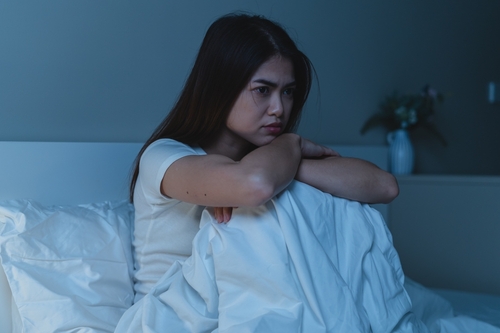I’m sure many women don’t know (I sure didn’t), but having babies can give you nightmares. It’s common, and hits 53% of women in the year after birth.
I will never forget a nightmare I had of a crocodile swimming away with my baby in a canal while I was desperately chasing, trying to get him back, but losing the race. It was awful, and so real.
Many women have dreams of losing their babies in their bed (even if they don’t co-sleep). Of losing or forgetting your baby somewhere (like the car). Of dropping your baby. And more.
Postnatal nightmares involve something bad happening to your baby in your dream, and become physical – they usually trigger movement. You’re lunging out of bed to find your missing baby. Throwing off the bedcovers to help your baby get air. Flying to the cot to check your baby is there, safe and sound. This is why postnatal nightmares are different to normal nightmares, as they trigger an immediate physical response to protect your baby.
Most mums need to check on their babies after a postnatal nightmare. They are so distressing that even when you know it’s just a dream, you still need to see your baby to be able to settle yourself.
It’s suggested that hormonal changes and strong maternal concern (you love your baby and want to protect them) contribute to postnatal nightmares, along with sleep deprivation. But here’s the irony – if you have nightmares, you don’t want to go to sleep because this can be distressing. Not to mention that it can be hard to get enough sleep when you have a baby. Yet, lack of sleep makes you more vulnerable to more nightmares.
If postnatal nightmares are occasional, this is normal.
If postnatal nightmares are a regular visitor for you, unfortunately, they can be a symptom of postnatal distress and mental health concerns.
If you are bothered by postnatal nightmares, you can try:
- Reminding yourself these nightmares show your caring and protection for your baby, even though they are distressing. They are a sign of a mum who cares about their baby being safe.
- Try to increase your sleep. (I know, I know! You have a baby AND nightmares- it’s a problematic suggestion. The irony and challenge of this is real. And, more sleep can make you less vulnerable to further nightmares.)
- Practice relaxation or self-soothing skills in bed, before sleep, and after waking up distressed.
- If you have regular nightmares about your baby, seek help – a trusted GP is always a good start.
- Reduce stress in your life, if possible.
- And, you might try nightmare rescripting.

